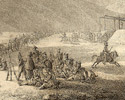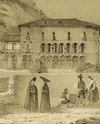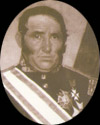19th Century´s militar history in the Basque Country
GASPAR JAUREGI "THE SHEPHERD". (1791-1844)
 Jauregi was born in Urretxu in September 1791. As the son of a shepherd, he accompanied his father in his work ever since he was a child and thus had an excellent knowledge of the territory for when the French invaded in 1808. Two years afterwards, he began his guerrilla activities by attacking diverse French couriers. The pressure of Napoleon's troops on his party forced him to flee to Navarre, where he joined the Corso Terrestre of Espoz Mina. After a few months at the orders of the famous Navarrese guerrilla fighter, the latter gave Jauregi 60 Guipuzcoans to go to fight in Navarre and extend the guerrilla war to the province of Gipuzkoa.
Jauregi was born in Urretxu in September 1791. As the son of a shepherd, he accompanied his father in his work ever since he was a child and thus had an excellent knowledge of the territory for when the French invaded in 1808. Two years afterwards, he began his guerrilla activities by attacking diverse French couriers. The pressure of Napoleon's troops on his party forced him to flee to Navarre, where he joined the Corso Terrestre of Espoz Mina. After a few months at the orders of the famous Navarrese guerrilla fighter, the latter gave Jauregi 60 Guipuzcoans to go to fight in Navarre and extend the guerrilla war to the province of Gipuzkoa.
From January 1811 up until the expulsion of the French in the summer of 1813, his guerrilla tactics were continuous both in Gipuzkoa and in the neighbouring Alava and Bizkaia. Tomás Zumalacárregui was under his orders, acting as his secretary and teaching him to write.
After the war, which he ended with the rank of colonel, he did not continue with his military career but instead turned to work as a trader and was also Mayor of his home town, Urretxu.
 During the Liberal Triennium, he sided with the government cause and fought as commander of the Voluntary Militias against former-companions such as Zumalacárregui who had joined the realist guerrilla war. However, the entry of the 100,000 Sons of Saint Louis to restore the absolute monarchy forced him into exile in France. After the amnesty of May 1824, he returned to his village but was again exiled in 1830, this time to Bayonne, where he organised an invasion to restore the constitutional regime with Espoz Mina. A lack of popular support led to the failure of the invasion and his exile once again.
During the Liberal Triennium, he sided with the government cause and fought as commander of the Voluntary Militias against former-companions such as Zumalacárregui who had joined the realist guerrilla war. However, the entry of the 100,000 Sons of Saint Louis to restore the absolute monarchy forced him into exile in France. After the amnesty of May 1824, he returned to his village but was again exiled in 1830, this time to Bayonne, where he organised an invasion to restore the constitutional regime with Espoz Mina. A lack of popular support led to the failure of the invasion and his exile once again.
After the death of Ferdinand VII, the Liberal authorities called on him to lead the Guipuzcoan troops against the Carlists. He was appointed brigadier and took part in the main battles of this war, leading the mobile column of Volunteers of Guipuzcoa, the Txapelgorris. He was again forced to fight his former assistant Zumalacárregui , both in Ormaiztegi and in Deskarga suffering severe defeats both times.
 He appeared to adopt a firm anti-Carlist stance but respected the civil population and tried to keep damage to the province to a minimum. This is why he fought against "fire-starter" generals such as Rodil and O'Donell.
He appeared to adopt a firm anti-Carlist stance but respected the civil population and tried to keep damage to the province to a minimum. This is why he fought against "fire-starter" generals such as Rodil and O'Donell.
After retiring from his position due to ill health, he began to sympathise with Muñagorri and his "Peace and Fueros (regional charters)" movement towards the end of the war, although his loyalty to the constitutional government meant that he was unable to join Muñagorri.
After the Abrazo de Bergara, he was appointed "Alcalde de Sacas" or provincial head of the frontier in Behobia. He rose up against Espartero in defence of the Fueros in October 1841 and returned once again to exile after his failure. He lived in Bayonne until the fall of Espartero in 1843, when he was appointed Capitán General (governor general) of the Basque Provinces. He was eventually awarded the position of commanding general of the province of Alava, which he held until his death in Vitoria in December 1844.

